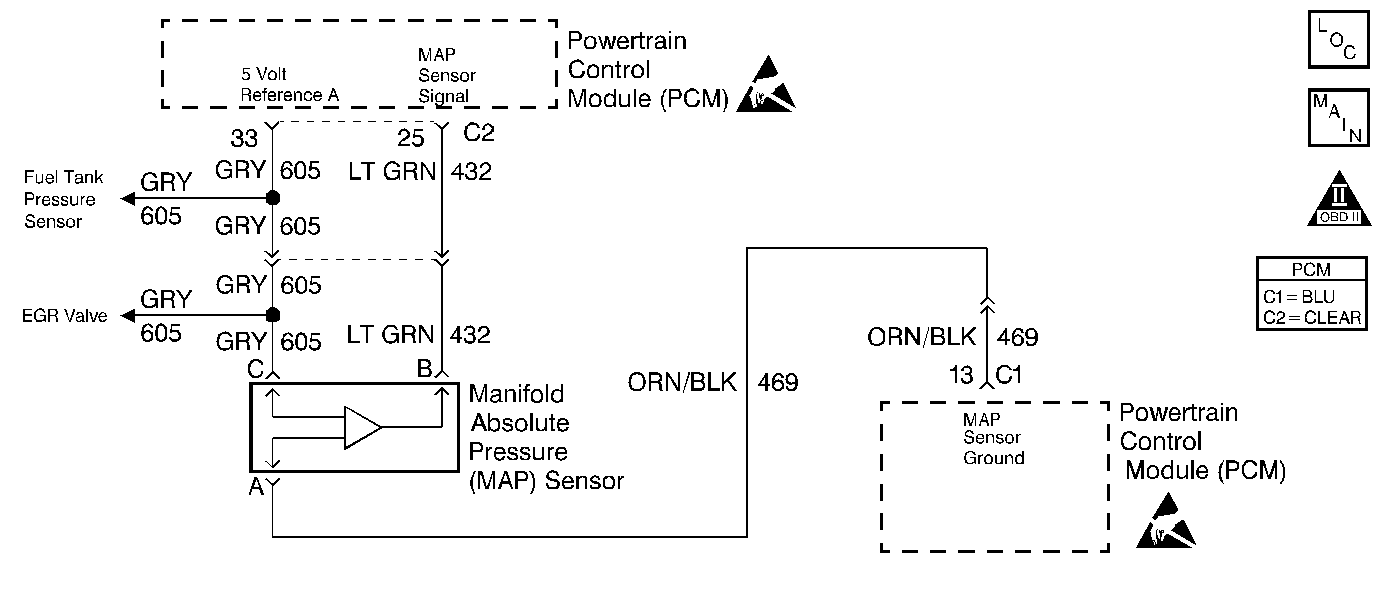
Circuit Description
The Manifold Absolute Pressure (MAP) sensor responds to changes in intake manifold pressure. The PCM supplies a 5 volt reference and a ground for the MAP sensor. The MAP sensor circuit provides a signal to the PCM relative to pressure changes in the manifold. With the key ON, engine not running, the MAP sensor signal voltage to the PCM varies between 1.5 to 2.5 volts. With the engine running, the MAP sensor voltage to the PCM varies from below 2 volts at idle (low manifold absolute pressure - high vacuum) to above 4 volts at wide-open throttle (high manifold absolute pressure - low vacuum). The PCM monitors the MAP signals for voltages outside the normal range of the MAP sensor. If the PCM detects a MAP signal voltage that is excessively low, DTC P0107 will be set.
Conditions for Setting the DTC
| • | No TP sensor DTCs present. |
| • | Sets with the key ON. |
| • | Throttle angle greater than 0%, if engine speed is less than 1000 RPM. |
| • | Throttle angle greater than 10%, if engine speed is greater than 1000 RPM. |
| • | The MAP sensor signal voltage is less than 0.1 volt. |
Action Taken When the DTC Sets
| • | The PCM will illuminate the malfunction indicator lamp (MIL) during the second consecutive trip in which the diagnostic test has been run and failed. |
| • | The PCM will store conditions which were present when the DTC set as Freeze Frame and Failure Records data. |
Conditions for Clearing the MIL/DTC
| • | The PCM will turn OFF the MIL during the third consecutive trip in which the diagnostic has been run and passed. |
| • | The History DTC will clear after 40 consecutive warm-up cycles have occurred without a malfunction. |
| • | The DTC can be cleared by using the scan tool. |
Diagnostic Aids
Check for the following conditions:
| • | Poor connection at the PCM--Inspect harness connectors for backed out terminals, improper mating, broken locks, improperly formed or damaged terminals, and poor terminal to wire connection. |
| • | Damaged harness--Inspect the wiring harness for damage. If the harness appears to be OK, observe the MAP display on the scan tool while moving connectors and wiring harnesses related to the sensor. A change in the display will indicate the location of the malfunction. |
If DTC P0107 cannot be duplicated, the information included in the Failure Records data can be useful in determining since the DTC was last set. If it is determined that the DTC occurs intermittently, performing the DTC P1107 Diagnostic Chart may isolate the cause of the malfunction.
Test Description
Number(s) below refer to the step number(s) on the Diagnostic Table:
Step | Action | Value(s) | Yes | No |
|---|---|---|---|---|
1 | Was the Powertrain On-Board Diagnostic (OBD) System Check performed? | -- | ||
2 |
Is MAP value near the specified value? | 0V | ||
3 |
Does the scan tool indicate DTC P0107 failed? | -- | Go to Diagnostic Aids | |
4 |
Is the MAP value greater than the specified value? | 4.6V | ||
5 |
Is the MAP value greater than the specified value? | 4.6V | ||
6 |
Was a problem found? | -- | ||
7 |
Was a problem found? | -- | ||
8 |
Was a problem found? | -- | ||
9 |
Was a problem found? | -- | ||
10 | Replace the MAP sensor. Refer to Manifold Absolute Pressure Sensor Replacement Is action complete? | -- | -- | |
Replace the PCM. Important:: The replacement PCM must be programmed. Refer to Powertrain Control Module Replacement/Programming . Is action complete? | -- | -- | ||
12 |
Does the scan tool indicate DTC P0107 failed? | -- | System OK |
